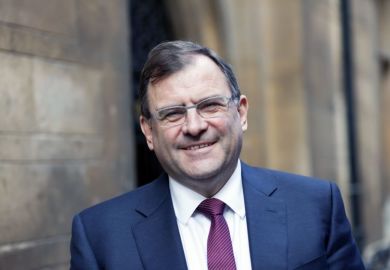A lack of “brave” thinking by a once-in-a-generation review has left Australian universities mired in policy torpor when a “radical reset” is desperately needed, according to the departing boss of the country’s top-ranked institution.
Duncan Maskell said the Australian Universities Accord’s failure to “redesign the system from the bottom up” had robbed the sector of the chance to adapt its business model to the federal government’s crackdown on international education.
This had left universities worse off than ever, facing a new financial crisis while old challenges remained unresolved.
Professor Maskell said the accord had been cast as an opportunity to do things differently. “We sort of stepped back from the brink,” he told Times Higher Education. “Now we’re left…with inadequate resources in the midst of a political argument about immigration.”
He said the “big potential reset moment” had arrived when the sector was recovering from Covid and money was “tight”. Funding constraints, “almost inevitably”, had prevailed. “Big, grand reset-type ideas were always going to struggle.”
Professor Maskell was due to end his tenure as University of Melbourne vice-chancellor on 5 December, after more than six years in the role. The former University of Cambridge pro vice-chancellor said that while he did not blame anyone in particular, the accord was a missed opportunity.
“We needed…the courage to take that leap [and] give young people of today options to be educated in the way they’d like, rather than making them fit into a model that is 30-odd years old.”
He noted that the architect of Australia’s last major higher education overhaul, 1980s education minister John Dawkins, no longer considered those reforms “fit for purpose”. Big reviews should be preprogrammed, he said. “We [should] have a proper discussion every 20 [or] 25 years built into the system. Things are changing so quickly in the world, in so many ways.”
While political wrangling has forced the federal government to defer its plan to cap international enrolments, both major parties remain committed to constraining the inflows of overseas students, who – in Melbourne’s case – provided 30 per cent of revenue last year.
Professor Maskell conceded that his university might need to cut back on the research that had propelled it into the top 50 of global league tables. “That might be a place that we get forced into over the next few years, if the funding doesn’t improve,” he said.
“At the moment, we have to find at least half of the money for some of the scientific research we do from our own resources. If we reset such that the…government paid something approaching the full economic cost of research, that would take all the pressure off in terms of having to take other sources of income. We could then make sensible decisions about the right combination of home and international students.”
He said he remained convinced that university tuition should be free, even though that seemed a remote prospect in the current funding squeeze. “We pay it back,” he pointed out. “I pay a lot of tax. I’ve paid for my education many, many, many times over.”
He said “almost nobody” would argue against free school education. “Why is it OK to provide free secondary education but not provide free tertiary education? The world’s got even more complicated. We need to try and get as many people through into tertiary education as we can.”
POSTSCRIPT:
Print headline: Departing Melbourne v-c: accord missed chance for genuine change
Register to continue
Why register?
- Registration is free and only takes a moment
- Once registered, you can read 3 articles a month
- Sign up for our newsletter
Subscribe
Or subscribe for unlimited access to:
- Unlimited access to news, views, insights & reviews
- Digital editions
- Digital access to THE’s university and college rankings analysis
Already registered or a current subscriber?







